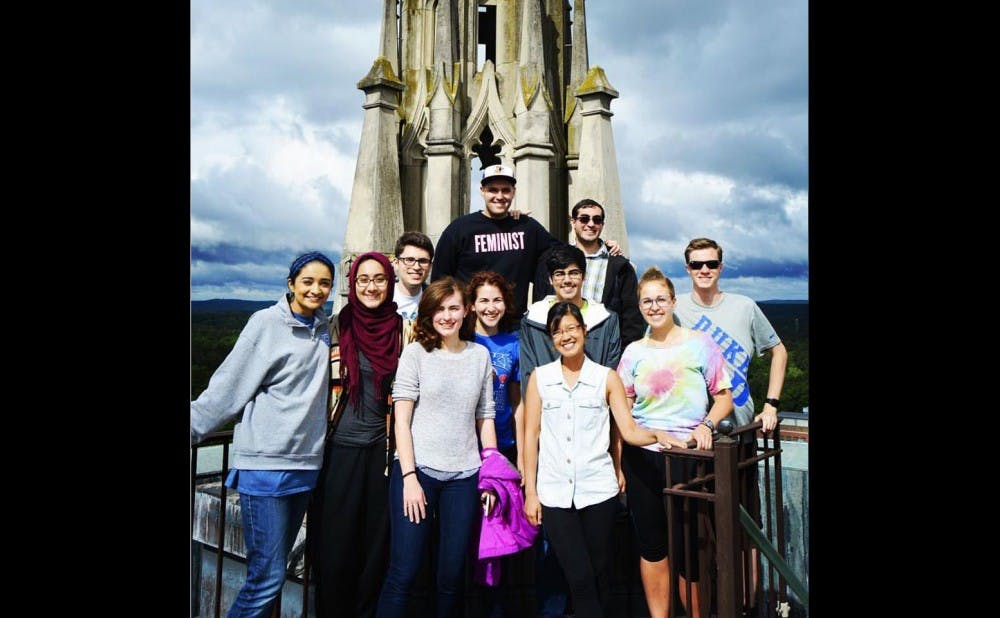Many students know that Duke’s motto is “Eruditio et Religio,” but what do the words meaning erudition and religion truly look like in practice? A new living learning community is bringing the phrase to life.
Eruditio et Religio, also called E&R, aims to help students build relationships with people of varying religious traditions and work together for a common good. The program includes a house course that explores religious diversity as well as community service opportunities.
“Today we need to come together across the religion line,” said Christy Lohr Sapp, associate dean for religious life, who helped create the living learning community. “I think we need to make space in our country for a diversity of expression. At Duke, we work hard to create an environment in which students of any religious traditions feel important.”
The program does not require membership or participation in a specific religious affiliation. Its website notes that it “welcomes all applicants—Atheist to Zoroastrian.”
Students will live together in Blue Ridge House on West Campus in Keohane Quad 4B and will participate in shared meals, house events, retreats, trips and religious exploration.
Sophomore Callie Keen, who has helped design E&R, explained that it grew out of the Interreligious Scholars Program, which Lohr Sapp launched with the intention of eventually expanding it.
“The idea was to foster interfaith dialogue and understand the importance of that,” Keen said. “We always envisioned that as a living community.”
She explained that E&R is structured around three main topics—education, intentional living and civic engagement. The education component will consist of the house course, which focuses on providing an introduction to diverse religious traditions and minimizing stereotypes. Intentional living involves the actual dorm community and forming relationships through dinners together, in which students can gain an understanding of each other’s faith.
In addition, they plan to participate in community service work around issues like mass incarceration or food insecurity.
“We found civic engagement and social action to be important components of any faith work,” Keen said. “They are the ties that bind any religious faith together.”
Students will also be encouraged to go to a few different religious services outside of their own to gain an understanding from a more authentic viewpoint, she explained.
Junior Aidan Workman, who has also been involved in creating E&R, noted that the program is hoping to bring in speakers or people from community and form ties with nonprofits in the area.
“The goal is to have some sort of service project that we’re all united around,” he said.
Keen said that she is not sure how many members will be accepted into E&R yet, but that the groups was given 14 rooms, so it can have about 28 members at most.
The applications, which closed Feb. 5, mostly asked questions about the student’s spiritual journey, connection with religion and interest in the living learning community. Keen noted that a big part of the application was the “so what?” factor.
“Interfaith work is something that we think is important with everything that we do in life,” she said. “It’s also kind of a matter of how do you see these topics and the importance of interfaith work connecting with your future goals.”
E&R made an effort to reach out to other religious groups on campus to encourage their members to apply with the goal of gaining a diverse collection of undergraduates.
Workman explained that he thinks E&R is needed at Duke because although some students have a wide range of religious backgrounds, there aren’t many avenues for interreligious dialogue.
“Especially in the climate at Duke, there is a lot of polarization and not a lot of opportunity to interact across ideological lines,” he said. “It can help students get to know more about value systems outside of what they were brought up with.”
Lohr Sapp noted that we can’t pretend our differences don’t matter and don’t show up in public life.
“People say you should never talk about politics and religion, but I think we have to talk about this because these are things that deeply divide people,” she said.
The name “Eruditio et Religio” is intended to bring to light the importance of talking about religious diversity within an educational setting.
“We chose the name specifically. It’s the motto of the University, but it’s not something we reflect on much,” Lohr Sapp said. “We hope that through this we will remind people of the history and legacy of Duke itself.”
Get The Chronicle straight to your inbox
Signup for our weekly newsletter. Cancel at any time.

